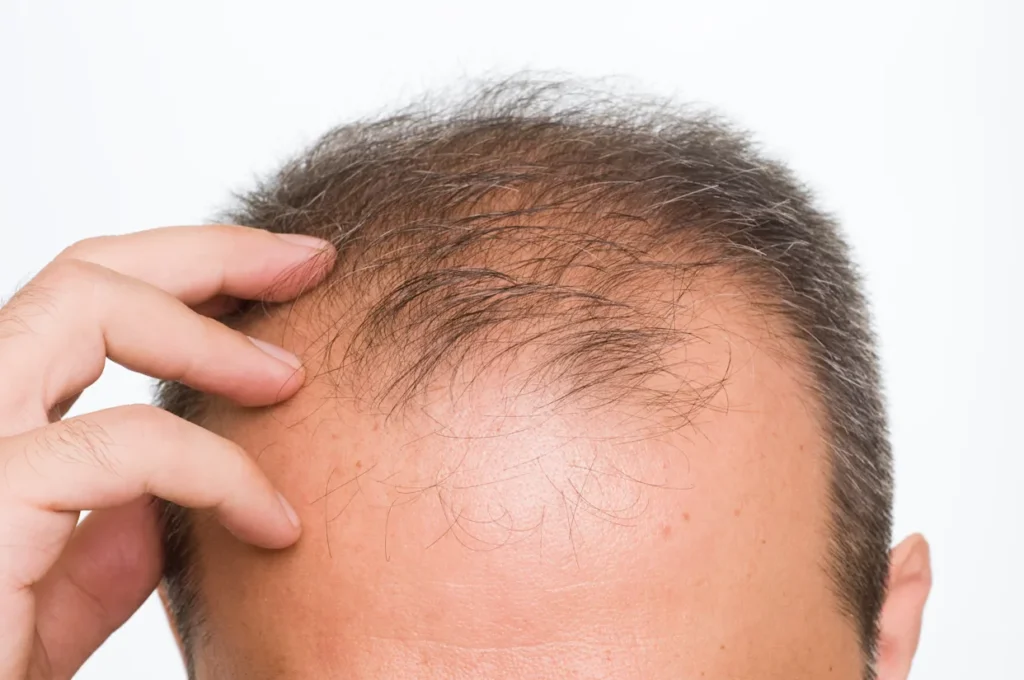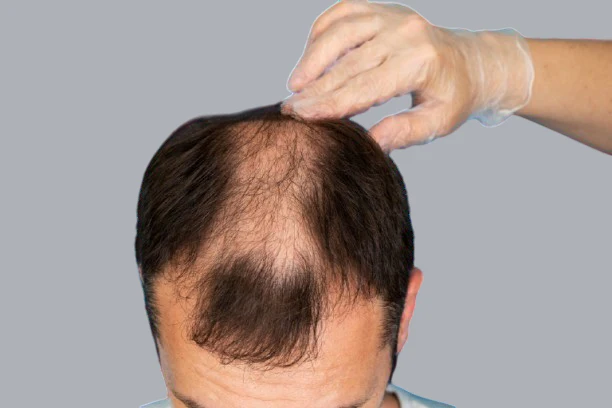Pollution related hair loss is becoming an increasing concern, with environmental factors significantly contributing to hair thinning and shedding. Pollution can cause oxidative stress, inflammation, and clogged hair follicles, all of which can lead to hair loss. This article explores the connection between pollution and hair loss, the signs to watch for, and effective steps …
Pollution related hair loss is becoming an increasing concern, with environmental factors significantly contributing to hair thinning and shedding. Pollution can cause oxidative stress, inflammation, and clogged hair follicles, all of which can lead to hair loss.
This article explores the connection between pollution and hair loss, the signs to watch for, and effective steps you can take to prevent and treat pollution-related hair loss. Understanding this issue will help you protect your scalp health and restore your hair.

What is Pollution Related Hair Loss?
The Connection Between Air Pollution and Hair Health
Pollution-related hair loss occurs when pollutants in the environment, such as particulate matter, chemicals, and free radicals, damage the hair follicles and disrupt the natural hair growth cycle. When these pollutants settle on your scalp and hair, they can cause inflammation, oxidative stress, and even block hair follicles, leading to thinning and shedding over time.
Common Pollutants Linked to Hair Loss
Several pollutants are particularly harmful to your hair, including:
- Particulate Matter (PM2.5): These fine particles can penetrate deep into the skin and hair follicles, leading to inflammation and oxidative damage.
- Heavy Metals: Substances like lead and mercury, often found in polluted air, can disrupt hair growth.
- Carbon Monoxide: This harmful gas can reduce oxygen levels in your body, leading to insufficient nutrients reaching your scalp, weakening your hair.
- Smog and Chemicals: Exposure to smog and chemicals such as volatile organic compounds (VOCs) can cause scalp irritation and damage hair follicles, accelerating hair loss.
How Pollution Damages Your Scalp and Hair
Impact on Hair Follicles and Growth Cycles
When your scalp is exposed to pollutants, the hair follicles can become clogged and inflamed. This disrupts the natural hair growth cycle, causing premature shedding and slowing down new hair growth. Over time, continuous exposure to pollution can lead to a thinning scalp and weakened hair structure.
Scalp Inflammation and Blocked Hair Follicles
Pollution triggers inflammation in the scalp, which can lead to clogged pores. As the pores become blocked with toxins, it becomes difficult for hair follicles to grow new hair. Scalp inflammation also causes irritation, redness, and sometimes dandruff, further exacerbating hair loss.
Increased Oxidative Stress and Hair Loss
Oxidative stress is a condition that occurs when there is an imbalance between free radicals and antioxidants in the body. Pollutants like particulate matter and smog introduce free radicals that damage the hair follicles, causing premature hair thinning. This accelerates hair loss and weakens the growth cycle.
Signs That Pollution Might Be Affecting Your Hair
Thinning Hair or Increased Shedding
One of the first signs of pollution-related hair loss is noticeable thinning or an increase in hair shedding. If you observe more hair in your brush or shower drain, pollution may be contributing to the damage.
Scalp Irritation and Sensitivity
Pollution can irritate your scalp, causing dryness, itchiness, or sensitivity. If you find your scalp feeling inflamed or tender after being outdoors in a polluted environment, this could be a sign that pollutants are affecting your scalp health.
Dull and Lifeless Hair
Hair exposed to pollution often appears lackluster and dull. The pollutants strip the natural oils from your hair, leaving it dry and difficult to manage. If your hair feels more brittle or appears to have lost its shine, pollution could be the culprit.
Expert Tips for Preventing Pollution-Related Hair Loss
Daily Scalp Protection: Cleansing and Hydration
To protect your scalp from pollution, it’s crucial to cleanse your hair regularly. Use a gentle, sulfate-free shampoo to remove dirt, grime, and pollutants. Follow up with a moisturizing conditioner to keep the scalp hydrated and healthy.
Using Antioxidants for Scalp Health
Antioxidants play a key role in neutralizing free radicals caused by pollution. Look for hair care products that contain ingredients like Vitamin C, Vitamin E, and green tea extract. These ingredients can help fight oxidative stress and support healthy hair growth by protecting the scalp from further damage.
Protective Hairstyles and External Barriers
If you live in a highly polluted area or work in an outdoor environment, consider wearing protective hairstyles like braids, buns, or hats to shield your hair from direct exposure to pollutants. Additionally, using a protective hair spray can help create a barrier between your hair and the environment.
Nutrition and Supplements to Fight Pollution Effects
A healthy diet is essential for combating the effects of pollution on your hair. Incorporate foods rich in vitamins, minerals, and omega-3 fatty acids to nourish your hair from the inside. Supplements like biotin and zinc can also support hair growth and reduce hair shedding.
Pollution’s Effect on Hair Across Different Environments
Urban vs. Rural Hair Health
People living in urban environments are more likely to experience pollution-related hair loss due to the higher concentration of pollutants in the air. In contrast, individuals in rural areas may not be as exposed to the same level of air pollution, potentially reducing the risk of pollution-induced hair thinning.
Outdoor Workers and Pollution Exposure
Individuals working outdoors or in polluted industries are at greater risk for hair damage. Exposure to harmful chemicals, dust, and smog can lead to quicker deterioration of scalp health, making hair more prone to thinning and loss.
Pollution in Indoor Environments
Indoor air quality can also impact hair health. Chemicals in household cleaning products, poor ventilation, and air conditioning systems can contribute to an environment that fosters hair loss. Ensuring proper ventilation and reducing the use of harsh chemicals indoors can help minimize damage.
Treatment Options for Pollution-Related Hair Loss

Hair Regrowth Treatments and Topical Solutions
Minoxidil, commonly used for hair regrowth, can help restore thinning hair caused by pollution. Consult with a dermatologist to explore whether this treatment could work for you. Other topical treatments that contain ingredients like caffeine or biotin may also help stimulate hair follicles.
Scalp Treatments and Detoxifying Products
Detoxifying treatments, such as clay masks or scalp scrubs, can remove pollutants from the scalp and unclog hair follicles. These treatments promote a healthy scalp environment and encourage new hair growth by clearing away toxins.
Professional Hair Restoration
For severe cases of pollution-related hair loss, professional treatments like Platelet-Rich Plasma (PRP) therapy or Follicular Unit Extraction (FUE) can help regenerate hair follicles and stimulate new hair growth. Consult a hair specialist to determine the best treatment option for you.
FAQs
Can Pollution Cause Permanent Hair Loss?
Pollution-related hair loss is often reversible if addressed early. By taking the right steps to protect and nourish your hair, you can prevent further damage and promote hair regrowth.
How Can I Protect My Hair from Pollution on a Daily Basis?
To protect your hair, follow a daily routine that includes regular cleansing, using antioxidant-rich products, wearing protective hairstyles, and avoiding exposure to pollutants whenever possible.
How Can I Protect My Hair from Pollution on a Daily Basis?
To protect your hair, follow a daily routine that includes regular cleansing, using antioxidant-rich products, wearing protective hairstyles, and avoiding exposure to pollutants whenever possible.
Are Certain Hair Types More Vulnerable to Pollution-Related Hair Loss?
Yes, people with finer or more sensitive hair may be more susceptible to pollution-related damage. This is because fine hair is more prone to breakage and can become easily weighed down by pollutants.
What Products Should I Use to Prevent Pollution-Related Hair Loss?
Look for shampoos and conditioners that are sulfate-free and designed to protect hair from environmental stressors. Products containing antioxidants like Vitamin C, E, or green tea extract can help fight oxidative stress.
Ready TO Take Your Next Step
Pollution-related hair loss is a serious concern, but with the right precautions, it is possible to protect your hair and scalp from environmental damage. By following the tips outlined in this article, you can take proactive steps to maintain healthy hair, even in polluted environments.
If you’re concerned about pollution-related hair loss, schedule a consultation with Dr. Uzma Irfan, an ISHRS-certified surgeon in Islamabad today to explore personalized solutions and treatments for your hair health.






